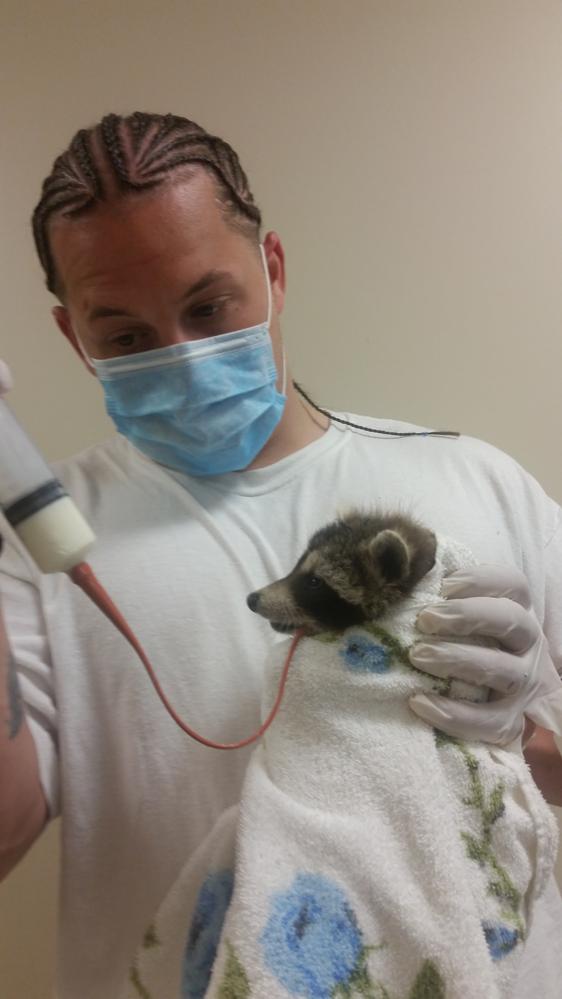
On a recent weekday, Jason Campbell and Hector Abreu-Garcia are hovering like first-time fathers over their charges, gently massaging the baby raccoons. “Do you hear him? He’s purring like a cat,’’ Campbell says.
Adds Abreu-Garcia, a raccoon clinging to his chest: “This is the fun part of the job.’’
The men are pre-release inmates from the Norfolk County Correctional Center in Dedham and they are participating in an innovative Animal Care Training Program at the New England Wildlife Center in Weymouth. Five days a week for six weeks, a handful of young men get the chance to work with Dr. Greg Mertz, whose team rescues and releases whatever injured wildlife that are brought in, from raccoons to rattlers, squirrels to swans.
Mertz is also known as “the odd pet vet,’’ and has taken care of just about any wildlife and domestic animal out there. He’s the CEO and chairman of the board at the wildlife center, and, he says, “also the janitor.’’
The center is about people, too. For years, it has hosted community groups, and every Saturday its Catbird Cafe has open mike night, which draws musicians, poets, and dancers from south of Boston. High schoolers, college students, and even post-grad vets work here. People with disabilities help out.
“You cannot be an effective humane organization without considering people, too,’’ Mertz says. He adds: “A lot of humane organizations are not humane to people.’’
As part of its mission of integrating people and animals, the center puts nonviolent offenders to work, in hopes of teaching them skills that will help them get a job upon release.
“It’s from Yale to jail here,’’ says Katrina Bergman, the center’s executive director, who, as a recovering alcoholic, says she feels both a duty and an affinity toward the inmates, most of whom were charged with substance-abuse crimes. She helps them with their resumes, sets up AA meetings if they want them, and coordinates the field trips the men take to the Franklin Park Zoo and the National Marine Life Center in Bourne.
Each morning, she brings coffee and muffins, and she tries to connect the men to employers. “These guys just can’t catch a break,’’ Bergman says. “Their job prospects are so tough.’’
The center manages to hire about one man from each class. Each graduate gets a voucher at the end of the program, good for one day’s pay for a day’s work. It’s a way of getting them back into the center. Some return just to volunteer.
Accompanied by a corrections officer, the five men follow Mertz, who wears a Hawaiian shirt and baseball cap, on his rounds. Over the six weeks, they’ll learn about animal biology, diseases, how to handle, feed, and do a simple exam. They’ll observe surgery, help with anesthesia, be runners for whatever is needed. “It’s no different from our interns,’’ Mertz says.
On a recent day, he explains X-rays to them. “Before today, I didn’t know how an X-ray took pictures of things within you,’’ one of the men says. “It’s really fast light penetration.’’
Adrian Solis, 25, dons gloves as he prepares to feed a baby screech owl. “He’s just a few weeks old, see his face?’’ Solis says. “Before this, I really only liked dogs and cats, and barely cats. But I think when I get out on June 15, I may try to get a job at the zoo.’’
Mertz, who says the men are hard workers, reminds them to be careful: “Handling and restraining an animal safely is an intense skill set.’’ They all wear gloves and masks.
In the Quiet Baby Ward, a 21-year-old inmate begins to feed a baby squirrel formula through a syringe. “She’s an orphan,’’ he says. In the Medical Ward, an inmate is helping to draw up meds and fluids to administer to various birds, from gulls to hawks.
Norfolk County Sheriff Michael G. Bellotti is an enthusiastic partner in the program, which he says teaches the men job skills and motivates them. “It produces positive results for the inmate, the wildlife center, and, most importantly, the community at large,’’ he says. “If we can keep these men from committing crimes again, we’ve done our job, and the New England Wildlife Center is helping us do exactly that.’’
But perhaps Harry Silvia, the corrections officer who accompanies the men to each weekday class, puts it best.
“The men love coming to this,’’ he says. “They dread the weekends.’’
Bella English writes from Milton. She can be reached at english@globe.com.



